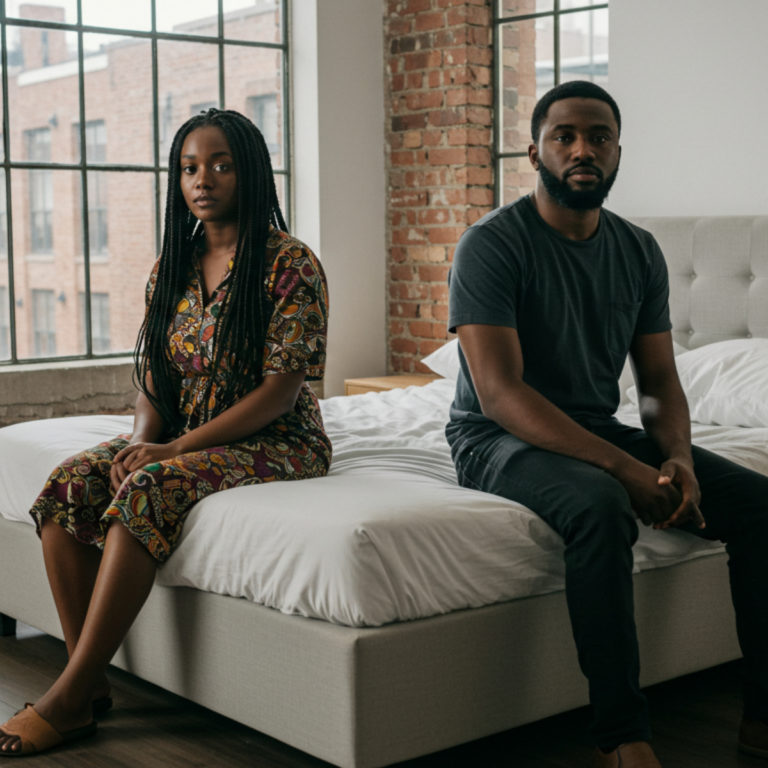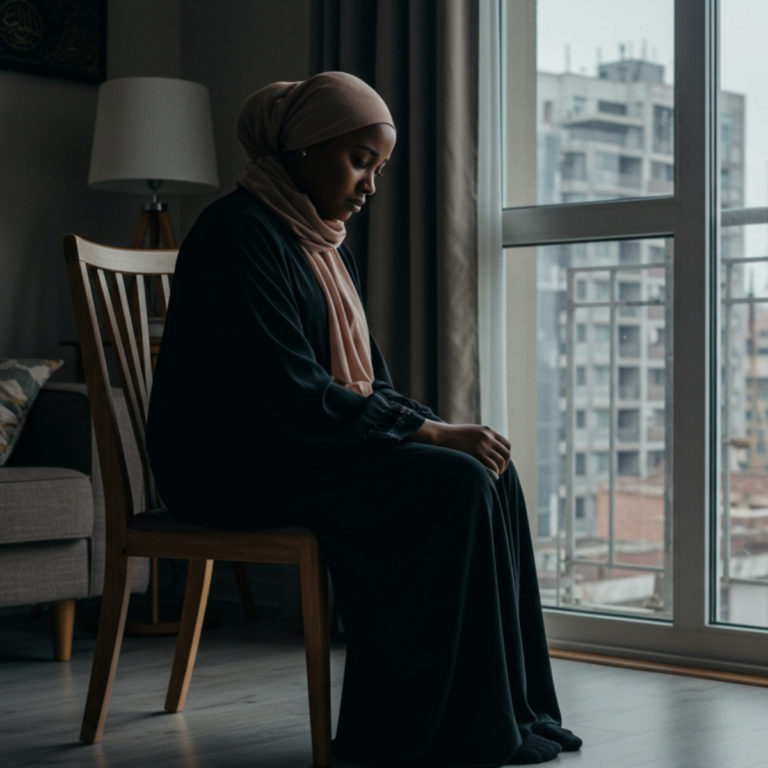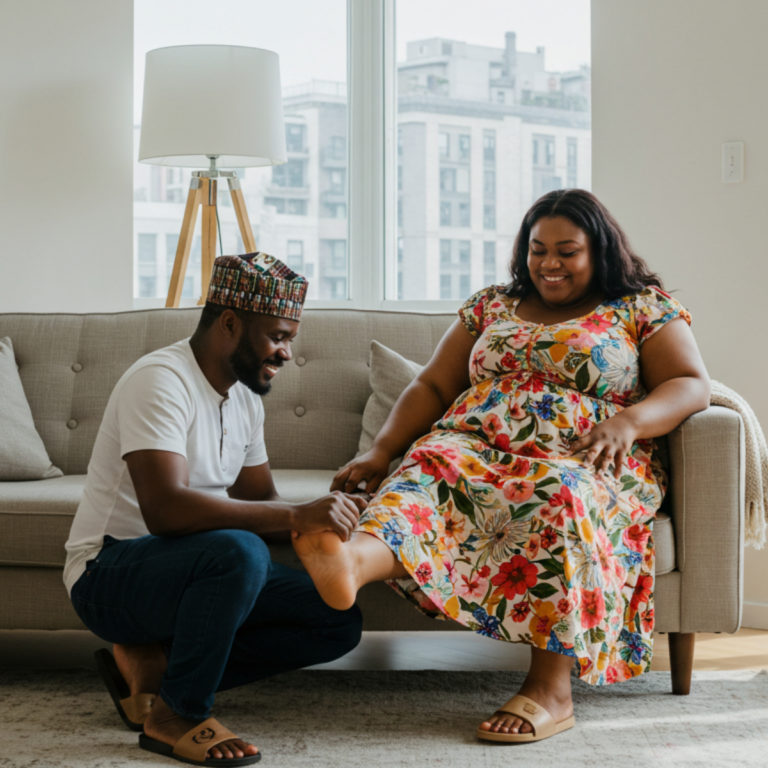Love Autopsy is a Zikoko series that dissects relationships after they’ve ended. In each episode, someone fresh out of a relationship sits down with a licensed relationship expert to unpack what went wrong, what could have been better, and the lessons they’re walking away with.
TW: Domestic abuse

*Dolapo, 34, an Ekiti-based civil servant, thought she had found the one in *Toba, 41, when they met in 2015 through an Egbon Adugbo.
A year later, they were engaged, and everything was perfect. His friends had only good things to say about him, and Dolapo felt secure knowing she was with someone so beloved.
“He was everything I wanted in a partner,” she says. “Kind, quiet, attentive, and always there when I needed him.”
Then the shift happened.
The mood swings came first. It was jarring, but she brushed it off.
“I’d say good morning, and he’d snap, ‘Did I ask you to greet me?’”
Then the silent treatment followed, often lasting for weeks. The man who had once been Dolapo’s safe space became emotionally unavailable to a point of hostility.
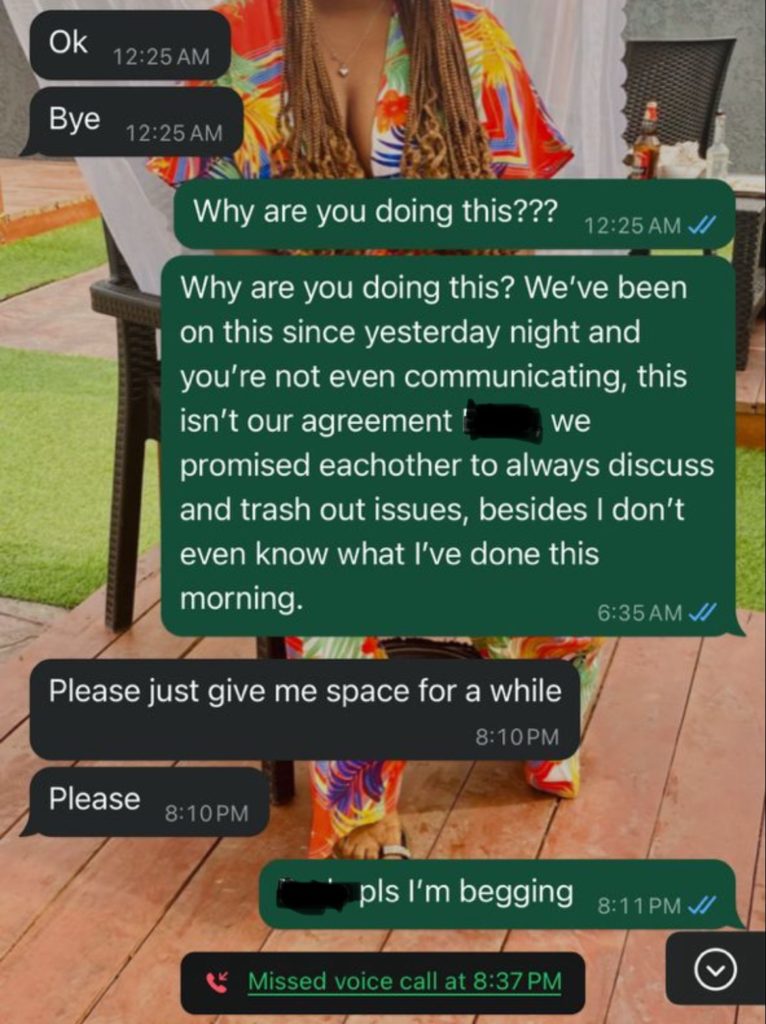
In 2024, as their divorce was being finalised, Toba told her it was all her fault.
“He said he got tired of me because I allowed his excesses,” Dolapo says. “He said I should have stood up to him, fought him harder or reported him to our families. He argued that I didn’t handle him the way he needed to be handled.”
Dolapo is recounting over Google Meet, her expression a mix of frustration and reflection. Comfort Omovre, who’s been a relationship counsellor for over three years, is also on the call. She listens carefully before responding. “That’s something I hear a lot. Abusers often blame their victims for the mistreatment. But it’s never your fault. A relationship shouldn’t be a battleground where you have to fight to be treated right.”
Dolapo nods in agreement. “I know that now. If someone tried that nonsense with me today, I’d walk away immediately.”
She continues. “And I noticed the red flags early. He was financially irresponsible and couldn’t account for his earnings, even though he demanded financial transparency from me. Then there was the emotional, financial, and even sexual abuse.”
“He would ghost me for months,” Dolapo recounts. “One time, he disappeared for eight months. Then he called like nothing happened, expecting me to show up — and I always did.”
“Did you talk to anyone about what was happening?” Comfort asks.
“No,” Dolapo admits. “I shielded him. I lied to my family about his whereabouts, made excuses for him, and painted a perfect picture when they asked. I convinced myself we were still connected, so I kept holding on.”
“Now that you mention it, there’s one incident I should share,” Dolapo says.
She was pregnant again. Then she had another miscarriage and needed an evacuation. Toba had promised to be there but he wasn’t. She waited for hours, calling him repeatedly.
Desperate, she called his mother, sobbing. Within 40 minutes, he finally arrived — but instead of apologising, he snapped, “What right do you have to call my mum and embarrass me?”
Comfort listens carefully. “Dolapo, I need you to know that everything you’ve described is abuse. This was never about love. It was about power and control. And I hope you can see how much strength it took for you to walk away.”
It took Dolapo three years and some help to find that strength; it wasn’t until 2021 that she realised the scale of her situation. “I found a post from a relationship therapist on Twitter talking about narcissistic abuse, and everything she described sounded like my relationship,” Dolapo says. “That was the wake-up call I needed. I filed for divorce in 2022.”
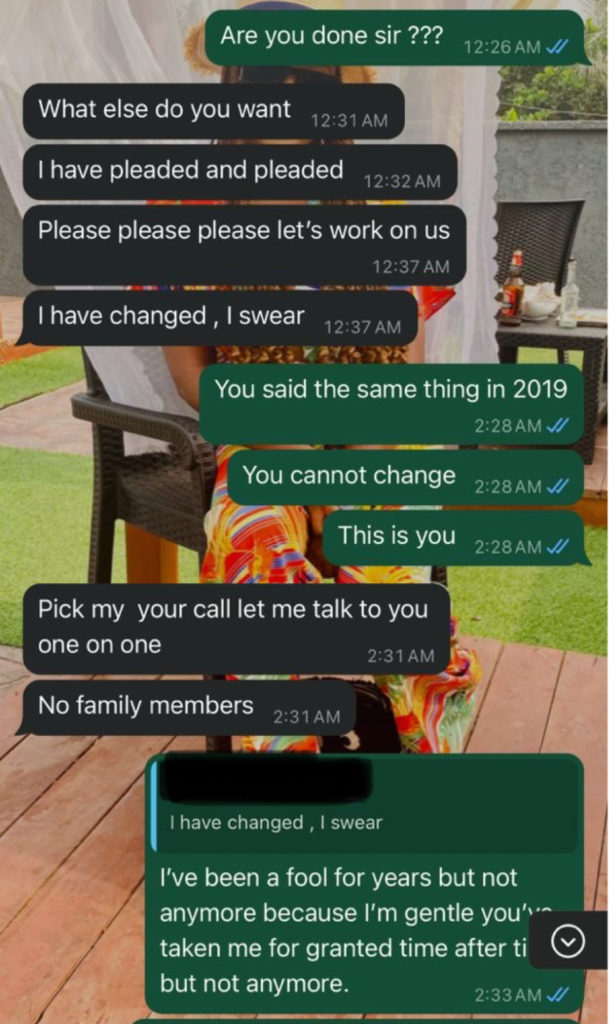
Toba didn’t take this move well. “He called my family members, crying and begging them to talk to me. People who had no idea what I’d been through suddenly became involved, asking me to reconsider. But I was done.”
Then he switched his tactics.
“He told me he was ready to change — he’d start therapy, we’d try IVF, we’d start a family. He even booked a marriage counseling session and asked me to come to Lagos. I wanted to believe him, so I travelled to Lagos.
I spent three days alone in an empty house, waiting for a man who’d never truly been there. That was the moment I knew there was nothing left to save.”
“And now?” Comfort asks gently.
“We finalised the divorce in December 2024,” Dolapo reveals.
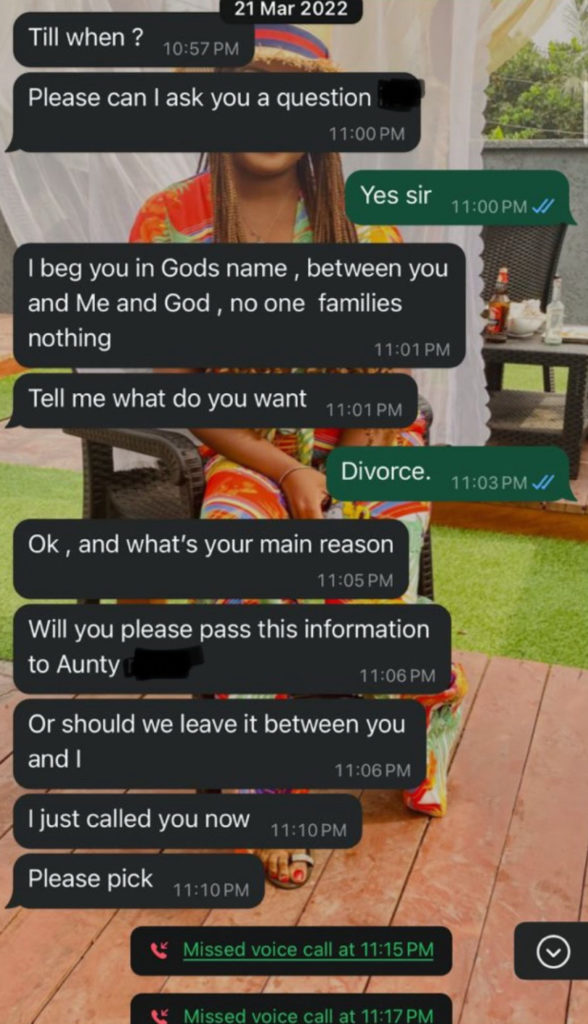
When Dolapo decided to start the divorce process, she knew there was only one way to break free: using the element of surprise, not giving room for his manipulations.
“I didn’t tell him when I filed for divorce,” Dolapo says. “I sent the papers to his family’s home. He was furious and got a lawyer to fight me. But I didn’t care anymore. I was done.”
“Now that your divorce has been finalised, how have you been processing everything?” Comfort jumps in.
“It’s been hard,” Dolapo admits. “On some days, I feel fine. Other days, I wake up crying, wondering why I wasted so many years. But I also prepared for the worst. I bought pepper spray and a taser because I knew Toba could show up at any time.”
ALSO READ: 4 People Tell Us About The Red Flag That Made Them End Their Relationships
Dolapo contemplates for a second before she continues. “My aunt tried to help me leave after he beat me so badly I was hospitalised for a month, but I stayed. I told myself I loved him, but I think I was just scared to be alone.”
“Many survivors struggle with guilt,” Comfort says. “What matters is that you finally left. You saw the truth, made a decision, and took your power back. It takes immense strength to do that.”
Dolapo sighs. “I hope so. I just wish I had done it sooner.”
“Healing isn’t linear,” Comfort reassures her. “But you’re already on the right path.”
Dolapo nods. “I’ve blocked him everywhere, but he has six different numbers. Every few months, he tries again — birthday messages, Christmas wishes, empty apologies.”
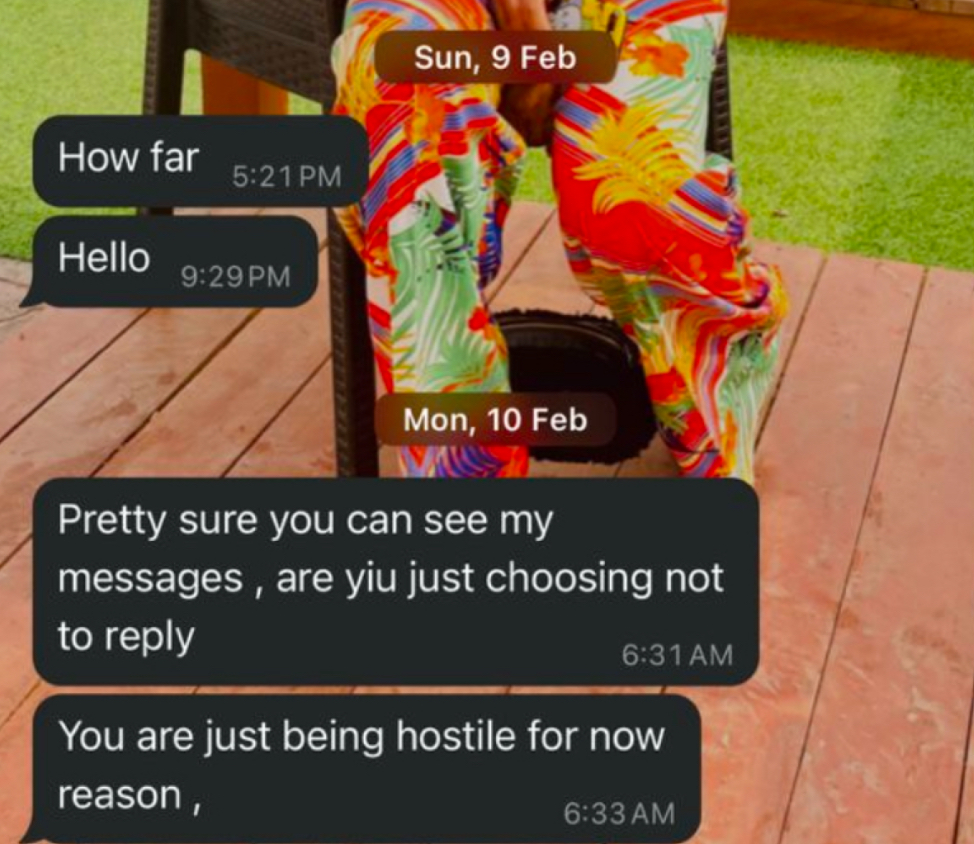
“That’s called hoovering,” Comfort explains. “It’s a classic abuser tactic: love-bombing, guilt-tripping, then insults when they don’t get their way. Have you noticed the shift?”
Dolapo exhales. “Exactly. After months of begging, he flipped. He called me a lowlife, mocked my job, and swore I’d die in Ekiti.”
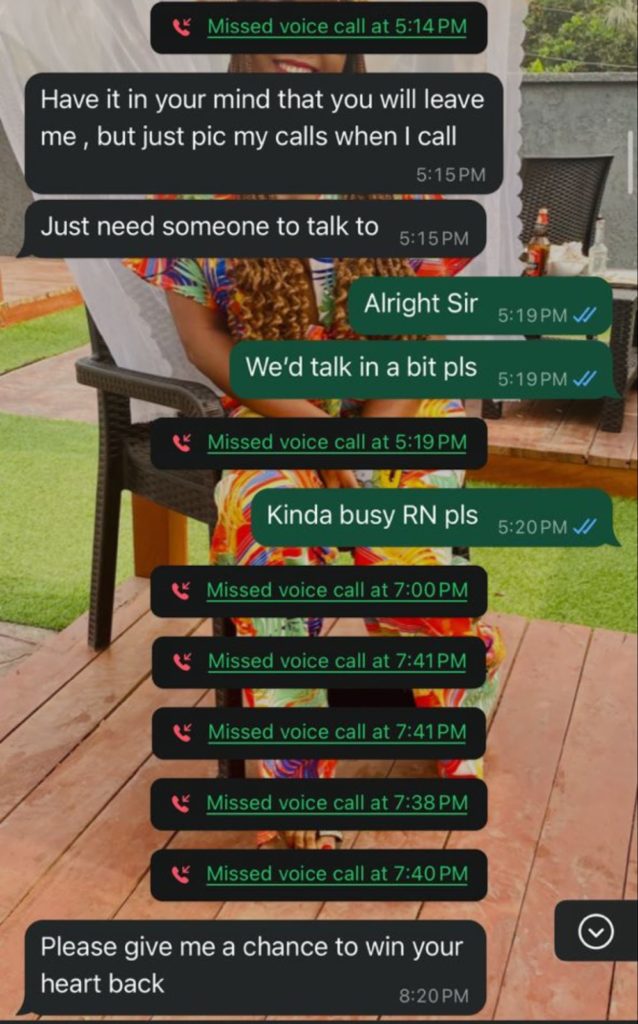
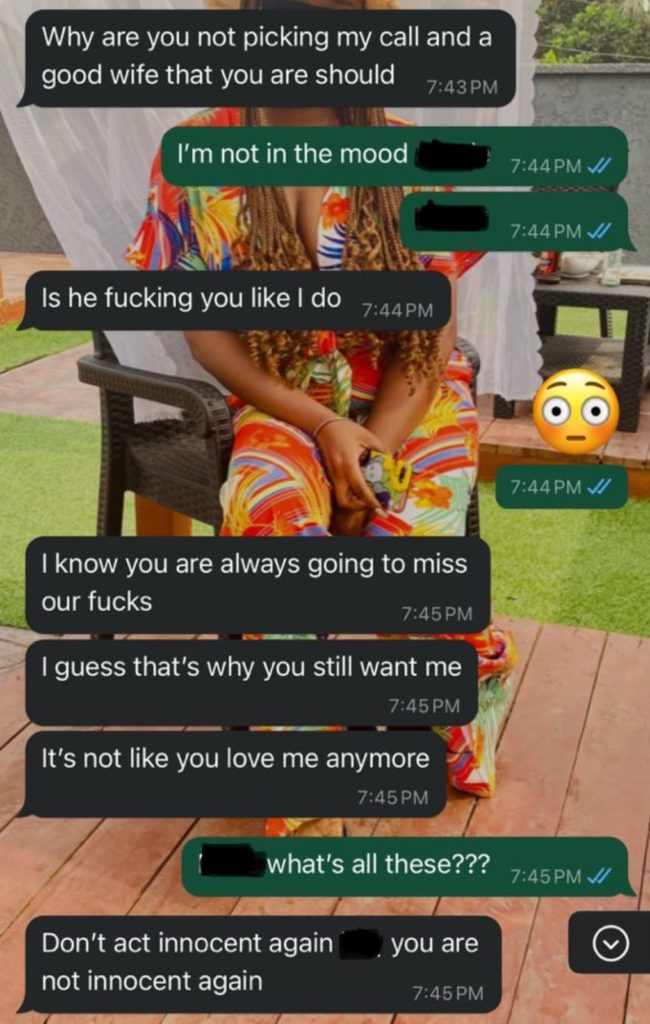
At first, Toba’s words stung, making her question her worth. But then she reminded herself — he didn’t send her to school, raise her, or contribute to her education. Her family had never relied on him financially. So why should he have the power to define her?
But his messages escalated. “I will come for you,” he threatened. “You think you can just leave me? You think you can disrespect me like this?”
“That was when I knew I had to protect myself,” she says. “I signed up for kickboxing classes. I told his best friend to let him know that I had already reported him to the police. I forwarded all his messages to my lawyer, my dad, and my brother. I wanted him to know that if anything happened to me, people would know exactly where to look.”
Comfort nods. “I’m so glad you took his threats seriously. Many abusers escalate their behaviours when they realise they’ve lost control. You did exactly what you needed to do.”
Dolapo draws a deep breath. “I regret ever meeting him, and it gets to me sometimes. There are nights I wake up crying. Nights I feel cheated by life.”
“That’s normal,” Comfort assures her. “You’ve come so far, and it’s okay to have moments of sadness. What’s important is that you got out.”
For Dolapo, the hardest part was unlearning the guilt she carried.
“I still blame myself for this situation. Maybe I should have fought back harder. Maybe I should have been smarter and never fallen for him in the first place.”
Comfort shakes her head in disagreement. “That’s the thing about abuse — it’s never the victim’s fault. You didn’t ‘allow’ anything to happen to you. You were manipulated, controlled, and broken down.”
Dolapo nods hesitantly. “I feel like I should have seen it coming. Maybe I was naive.”
“You weren’t naive,” Comfort gently corrects her. “Abusers don’t show up in devil horns. They come as everything you’ve wanted. And you’re not the only one. I’ve worked with highly intelligent, successful women in their 40s and 50s who found themselves in abusive relationships. It has nothing to do with being smart.”
Dolapo paused for a few seconds before she asks, “How do I make sure I don’t end up in another abusive relationship?”
Comfort sighs. “That’s the tricky part. There’s no foolproof way to avoid abuse. Even if someone seems perfect at first, they can reveal a different side over time. But there are things you can do to protect yourself.”
“First, look at your past experiences. Are there unresolved traumas — maybe from childhood, or previous relationships — that made you more vulnerable to staying in a toxic dynamic? Healing from those is key.”
“Second, educate yourself on what abuse really looks like. Now that you know the signs, you’ll be able to recognise them earlier.”
“Third, trust your gut. Abusers operate from the same playbook: love-bombing, isolation, blame-shifting, coercive control, mutual abuse. If something feels off, don’t dismiss it. Pay attention.”
Dolapo takes it all in. “That makes sense.”
“And finally,” Comfort adds, “stop blaming yourself. You think there was something you could have done differently, but the only way to avoid the abuse would have been never meeting him at all. The important thing is that you got out, and you get to rebuild your life on your own terms.”
Dolapo has left, but moving forward isn’t as simple as she’d hoped. The idea of dating again feels impossible.
“How do I even build up interest again?” she asks, the frustration evident in her voice. “Not even talking about dating immediately — just getting to the point where I can talk to a man, go on dates, get to know someone. Right now, if a man walks up to me and says, ‘I like you,’ I immediately detest him.”
Comfort listens carefully before responding.
“There’s no rush. You’re still hurting, and that’s okay. You were in the relationship for nine years — that’s enough time for someone to start university, get their master’s degree, and begin their PhD. That’s enough time for a baby to grow up and finish primary school. You can’t just move on from that overnight. In fact, trying to move on too quickly would do more harm than good.”
Dolapo nods in agreement. She knew Comfort was right.
“So what do I do in the meantime? How do I even begin to let go of all this resentment?”
“It’ll happen naturally,” Comfort promises. “As you continue to heal, the anger will start to fade. You’ll get to a point where you can make the distinction. Yes, this man hurt me, and yes, there are others like him out there. But there are also men who will love, respect, and treat me the way I deserve.”
Comfort pauses before adding, “But right now? You’re still grieving. And you can’t heal unless you’ve grieved fully.”
Dolapo exhales.
“I just feel like there’s a lot of pressure from people,” she admits. “Telling me to move on, to put myself out there again. But they don’t get it.”
“And they never will,” Comfort says firmly. “They haven’t lived your experience. They haven’t cried your tears, carried your pepper spray, or woken up every day rebuilding a life from scratch. So they don’t get to decide when you should be ready again. Only you do.”
For the first time in a long while, Dolapo allows herself to sit with that truth. There’s no deadline for healing. No timeline for moving on.
And when the time comes, she’ll know.
If you or someone you know is experiencing domestic abuse, there is help available. The International Federation of Women Lawyers, Women Impacting Nigeria and Mirabel centre offer pro bono legal support and medical care.
READ THIS NEXT: Step-by-step Guide to Seeking Justice Against Gender-based Violence

